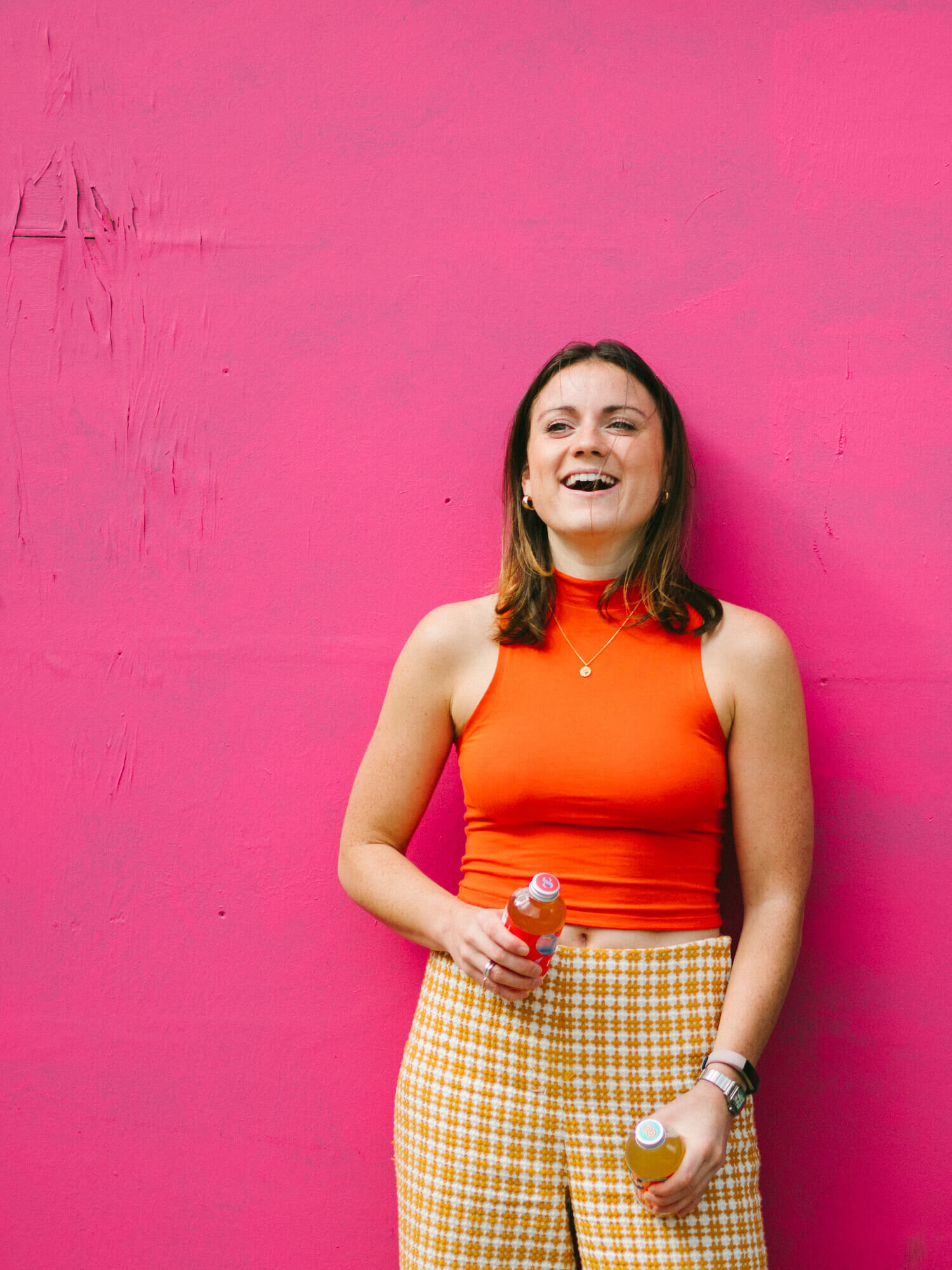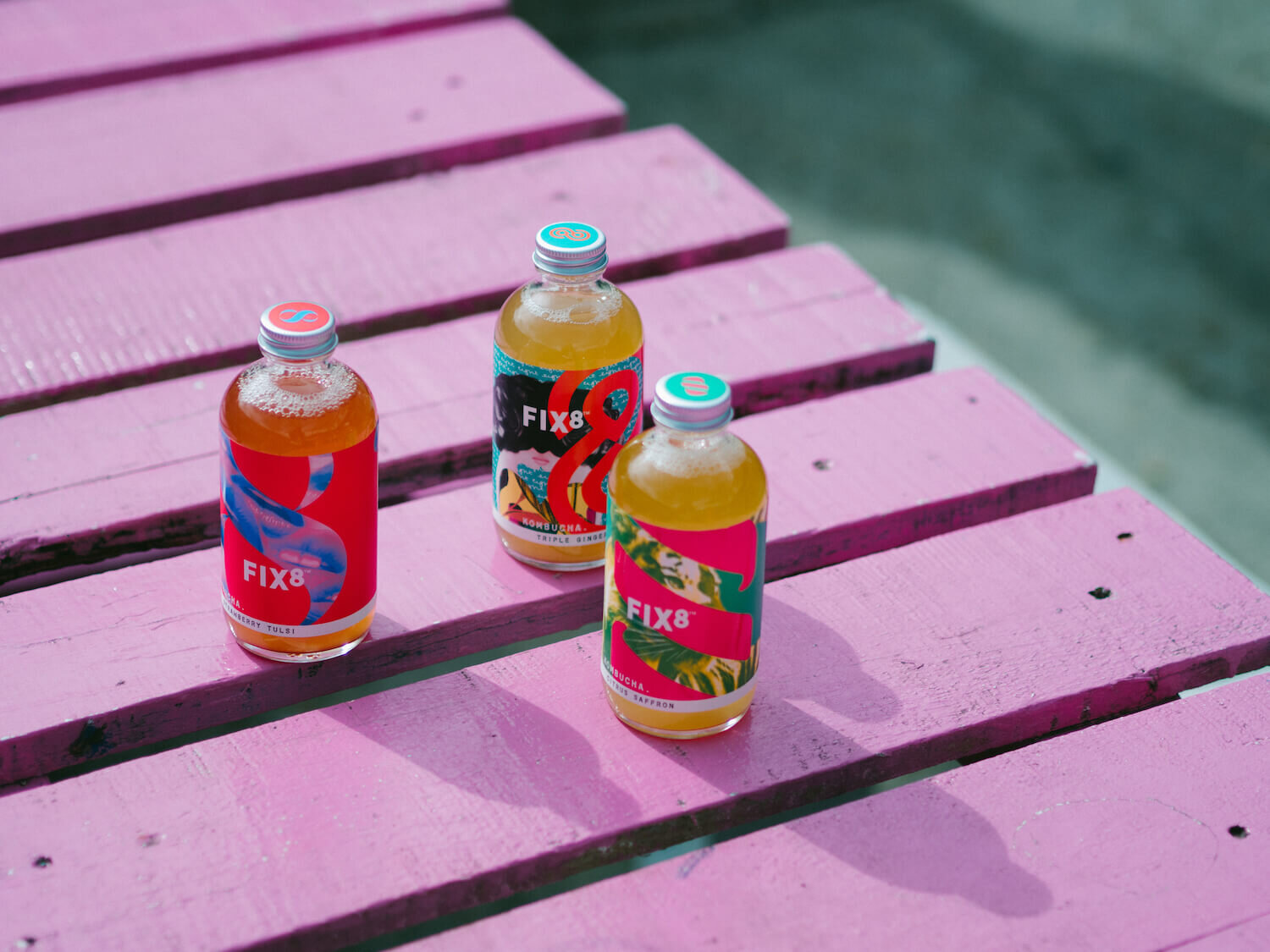Freya Twigden, Kombucha Brewer
FIX8
Lower sydenham,
south London
We are living in a funky, fermented world, and it’s the small-batch kombucha breweries who are coming up trumps. The fermented tea is a drinking experience like no other, and Freya’s obsession with it started in Shanghai and her Chinese medicine tutor’s homemade bottles. Back home, brewing batches of ‘booch under her desk at university soon escalated, and her parents’ flat quickly became a micro-brewery for testing batches to sell at a yoga studio café in north-west London. Following further research trips to Portland and Berkeley, and a sell-out stint at Wilderness Festival, Fix8 launched with three bottles: Strawberry tulsi (holy basil), triple ginger and citrus saffron. Combining fruits, herbs and spices for something altogether more complex, they’re calling out for a shot of gin on a hot summer’s day (or to be drunk straight from the bottle).
“Kombucha was a bit of an unexpected discovery for me. It’s a story that was never meant to be a story, it was just an adventure. I ended up living in Shanghai for a year as part of my politics degree at the University of Edinburgh. I had no idea about the culture, the language, the food; I like understanding my surroundings, so I started Mandarin lessons and studying Chinese medicine. One week, our tutor brought in some of her home-brewed kombucha and it was like nothing I’d ever tried before – it was so unique and gave me the satisfaction of having that cold, fizzy, refreshing drink, and she started telling me about the health benefits, too. I felt surprisingly energised after I drank any of her kombucha, and it became almost a religion for me – every time I’d go for class, I’d drink some of her kombucha. I became pretty obsessed with it.
I did a lot of travelling around Asia and I would always seek out kombucha wherever I went. When I got back to Edinburgh for my final year, I expected to find it and I just couldn’t. There was a little health food shop which had a very dusty bottle on the shelf. It didn’t look overly appealing, so I brought a kombucha culture online and decided to make my own. This was back in 2014, so all of my mates were watching Netflix and I was in bed reading about fermenting and brewing this bacteria under my desk. I didn’t tell anyone about it because it was slightly mortifying; every time we had people around for dinner, they’d see the kombucha cultures and be like, ‘Freya, you’re growing aliens, what is going on?’ I just loved it, though – making my own and drinking it became this morning tonic for me. At the time, I never planned to commercialise it, it was very much a passion project and I just wanted to learn everything about it.
When I graduated in 2016, I knew I didn’t want to go into politics, but I didn’t really know what I did want to do. I took some time off to go travelling; I went to India for about four months and did my yoga teacher training, thinking that was perhaps the route I was going to go down, but when I got back in December I was still completely obsessed with kombucha. A few people suggested that I should commercialise it; I knew as a consumer that what was on the market wasn’t hitting the spot for me, so I thought that maybe if I had that feeling, then maybe others did too. I was working in a café within a yoga studio in Camden (purely for the free yoga) and I started making kombucha for them. What was brilliant about that – little did I know at the time – was I could test my recipes, get feedback on flavours, and watch people drink it and sort of spy on them. I was living in my parents flat at the time and literally turned it into a kombucha micro-brewery.
We never stop working on our recipe, really, but it took just over a year [to perfect]. We incorporated the company in 2017, and I actually went on another adventure to America to learn as much as I could about commercial brewing – home brewing under your desk is very different to having a fully-functioning brewery. I travelled to Portland, Oregon; they have microbreweries everywhere. I also went to LA and met lots of brewers there, and also San Francisco, where I ended up working in a pickle shop in Berkeley for about a month. I made vats and vats of sauerkraut and kombucha – wherever I went, it was for kombucha purposes, I would seek out brewers on community boards. With the people who come to fermentation and kombucha, there’s this element of sharing – you start with one culture and then your kombucha will grow another scoby on top so you then get two, so intuitively you pass that on to somebody else.
We first launched on tap at a pop-up vegan burger bar, then we went to Wilderness Festival and did burgers and ‘booch on tap. We didn’t really know how people would respond, but we’d sold out by the Sunday. On that day, our first 20 orders were just people there for the kombucha and we were serving it to them by the pint, to sort out their hangovers. Of course, we had people there using it as a mixer, too, but it was a real confirmation piece for us that there was an appetite for it. We launched the first bottle in October 2018.
“W
e name all of our batches after inspiring females, so we’ve had every batch from beyoncÉ to my mum…Kombucha has a nice female energy
”
Freya Twigden
It’s difficult with any sort of live, fermented, organic product, where essentially the microbes are doing the work. For example, you can bake a cake with specific ingredients and pretty much get the same result every time, but with kombucha you’ve got so much more at play. You’re using a living, wild culture of yeast and bacteria, so the way in which we do that is we try to control all of the variables: time, temperature, water quality, ingredients, temperature of the fermentation room. We have purified oxygen going into our fermentation room being fanned around at the same temperature and being extracted so it has clean, filtered air constantly to work with.
There are four of us: Michael, my co-founder, Chris, our head brewer, and Helen, our accounts director. Our brewery is in Lower Sydenham, south London, and it’s about 30,000 square feet. As you walk in, we’ve got an office, a brewing production space with our big stainless-steel tanks, and that’s where we make the sweet tea solution, then we add the live culture, the scoby, and it goes into a fermentation room so it’s temperature controlled. We probably have about 10 tanks in there at the moment. We name all of our batches after inspiring females, so we’ve had every batch from Beyoncé to my mum. Kombucha has a nice female energy, and it gives it some personality.
We ferment for between 10 and 12 days. As every batch is different, we do a lot of testing with the acid and pH – there’s a bit of intuition and science. To make kombucha taste good, you need to have a balance of acids. We use 70% green tea, which is grown in the southern hills of India at high altitude (so it’s more oxygen rich), and 30% black tea. We use sencha so it’s beautiful and woody and a nice balance to the complex depth of the black tea.
We have three flavours: Triple ginger, strawberry tulsi and citrus saffron. We wanted a fiery one, a fruity one and a botanical one. We actually worked with a herbalist on the flavours. We knew we wanted to create some more sophisticated flavours; what was already on the market was quite monotone. We wanted to create some complexity with a fruit, herb or spice combination. We knew we were going to have some sort of ginger kombucha because globally it’s the most renowned – ginger and kombucha is a love affair you don’t want to get involved with. We put ginger oil, ginger extract and ginger juice in ours to give it a nice aroma and a little bit of heat. Our citrus and saffron kombucha was inspired by gin. We wanted to come up with a complex, evening kombucha which you could have instead of booze while not trying to be booze. It’s botanical, bright, zesty and it’s got tangerine oil, orange blossom, cardamom and saffron in, and it’s really nice to drink out of a wine glass, straight up with a bit of rum. We work with a lot of cocktail bars – the Savoy, the Connaught, The Goring. We’re thinking about doing a kombucha mixer… What’s good about kombucha is that it can offer complexity to a cocktail without necessarily increasing the ABV. One of my favourites is a kombucha negroni – you’re still getting that interesting, complex flavour without the hangover in the morning.
When you’re making kombucha at home, always sterilise your equipment and make sure your foundation is clean. Then make sure you’re working with good-quality ingredients – beautiful tea, ideally organic, quality sugar, filtered water is best, and a good, mature scoby (know and trust where you get your scoby from). Kombucha loves consistency: It wants to be left alone for 10 days or so to work its magic.
For more, plus online orders, visit fix8.com
@fix8onthis


